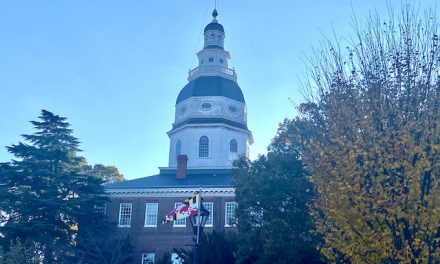Photo above by DafneCholet with Flickr Creative Commons License
By Roy T. Meyers
For MarylandReporter.com
In Monday’s column, Barry Rascovar claimed that an “easy budget fix” for Maryland would be to stop projecting revenues in favor of using a previous year’s levels, and shifting the fiscal year from July-June to January-December.
His arguments are greatly flawed. Here are a few of his assertions (paraphrased in italics), and the sensible counters to them:
- Maryland’s revenue estimates are “wild guesses.”
In fact, the state’s forecasters are professionals who work on a consensus basis, and their work for the Board of Revenue Estimates is generally excellent, with relatively small error rates.
- Prior year revenue levels could be used for the budget “with 100% accuracy.”
That’s not the case for the governor and his staff, who finish budget preparation during the fall. They would still have to estimate the final revenues for what is called the “current year” by budget experts. The final figures for that year wouldn’t be available on December 31.
The “closeout” of that budget–when final figures are certified–takes at least several months. This would mean the budget year’s “estimated” revenue figures wouldn’t be settled until half way through the legislative session, at best.
Imagine that this system was in place now. By sometime in the spring of 2015, revenue figures from the calendar year of 2014 would be available. They would be the basis of the budget prepared for the budget year 2016, which would begin in January of that calendar year. In other words, Rascovar’s proposal would actually lengthen the period between settling on a revenue figure and the budget year to which it would apply.
The odds are close to 100% that this system would be more inaccurate than the current system. Rather than making a best estimate of revenues for 2016, the state would be forced to use revenue figures for two years prior–intentionally ignoring any new information learned since then.
- Starting the fiscal year in January rather than the previous June would give greater certainty about spending levels financed by the federal government.
Here I have to quote in wonderment: “We’d also know with precision the scope of federal appropriations to the state and localities for most of 2015. That’s because Washington operates on an October to September fiscal calendar. We’d have an accurate picture of federal largesse for three-quarters of the next year.”
It’s heart-warming that there’s at least one person in the U.S. who has faith in the Congress’s ability to pass appropriations bills on time. But the fact is that in some recent years, the Congress hasn’t passed appropriations until after what would be the start of the state’s fiscal year.
The state’s experts already do a reasonably good job of estimating how the federal government’s spending might affect the state (much of which is not financed in annual appropriation bills).
- Revenue misestimates are the main cause of unanticipated state budget deficits.
Rascovar does mention some “spending gaps” such as for “catastrophic occurrences,” but he hasn’t thought through how changing the timing of the fiscal year would also affect the accuracy of spending estimates. Each year’s budget deficit is due in part to the need to make deficiency appropriations for underestimated spending.
These mistakes can result from the difficulty of projecting demand and price levels for mandatory spending programs, and also of guessing about likely administrative actions. Changing the timing of the fiscal year would increase this problem by lengthening the projection period. The budget enacted by the General Assembly, now in April, wouldn’t begin until the following January, rather than the nearer July.
- Sweeping under-projected revenues into the state’s surplus would be the most rational way to save for a rainy day.
Here I’ll agree with those who have observed that in some years, notably those before elections, the state has failed to hold sufficiently large budget surpluses. But Rascovar would have the legislature meet in a summer special session if the governor proposed a supplemental budget to spend under-projected revenues.
Maryland’s budget is already balkanized enough with a surfeit of special funds and dedications; a special session would further reduce the likelihood that the legislature would take a comprehensive view of the state’s finances.
A better way of promoting prudence is setting more ambitious targets for adequate cyclical savings, while at the same time taking measured actions to prevent the buildup of long-lived liabilities, as was done in recent years for pension and health benefits for state employees.
- To quote again:“Compared with tax reform and downsizing government programs, changes to Maryland’s budget procedures would be fairly easy and straight-forward.”
It’s important to remember that just as with budgets, for the budget process there is no such thing as an “easy fix.”
Roy Meyers is professor of Political Science and Public Policy at the University of Maryland Baltimore County (UMBC). He can be reached at meyers@umbc.edu







What should be changed is the swearing in of Maryland’s newly elected Governor to December 1 or earlier of the election year, thus eliminating/minimizing a lame duck governor’s last minute foibles!
Professor, that’s all fine and dandy, but the Spending Affordability Committee is not bound by the BREs as they have shown in years past. I suspect that’s a large part of Mr. Rascovar’s point.
The state’s forecasters are expects, but this disagree and the disagreement often stems from the old Mao saying, where you sit is where you stand. A professor of politics surely is wise enough to recognize this. Simply look at DBM’s input into the BREs versus DLS in years past. It’s as clear as night and day, or put more otherwise, near 100% odds.
I don’t follow your third point at all, professor. CR expirations have rarely gone into the New Year–both historically and recently. While it’s true regular order hasn’t been a thing for almost a decade, it’s patently false to suggest most of the budgets haven’t come until after the New Year.
On Rascovar’s fourth point, I think you don’t fundamentally understand the budget process, Prof. Namely, the role of the rate set by the Spending Affordability Committee and the Governor’s traditional adherence to that figure. Rascover’s point, at least I think his point was, that Maryland’s deficits have become cyclical in nature because of overspending. In a state requiring balanced budgets, this means people are overestimate revenue; it’s born true by Governor’s adopting DBM figures over BRE and by manipulating SAC figures (and on rare occasion, ignoring them all together). I could have told you last year’s BRE numbers were off simply by looking at VA’s numbers. But this harps back to the original point.
The ivory tower may be nice, but Rascovar seems to have a better grasp of the budgetary process than you. If it only it were so simple. PS-the SAC hearings are open to the public. Ditto the few times a year BREs. And DLS is probably your safest source among them all.
These are tricky times to budget, yet Meyers is content with the status quo’s
convulsions due to bad estimates from BRE.
I don’t know Meyers has thought this through. He says ’14 revenues aren’t available until spring ’15. This is wrong,. The annual audit is finished December. Why does the state need to wait till the spring to synthesize the audited numbers into budget? Moreover, if Meyers would look at the timing of Federal financial statement audits, he would discover the state could adopt the Feds timetable and finish the audits 2.5 months after year end. Many Federal agencies dwarf the state’s complexity, spending, assets, and net worth. In fact the federal audits are finished November 15,even though Fed accounting systems are in poorer shape than the state systems.
Meyers touts the BRE’s professionalism and consensus. Even if I grant those points, is Meyers unaware of the political overrides occurring during the budget formulation process?
The budgeting process Meyers supports is biased towards spending more money sooner at the risk of back-filling when the projections are wrong. Rascovar’s ideas on the other hand aren’t widely practiced in state budgeting and seem to be more conservative but carry risks that can’t be experientially assessed.
Thank you Professor Meyers for calling Rascovar out on one of his typically ridiculous columns. Why anyone thinks he knows anything about politics and government has always been beyond me!